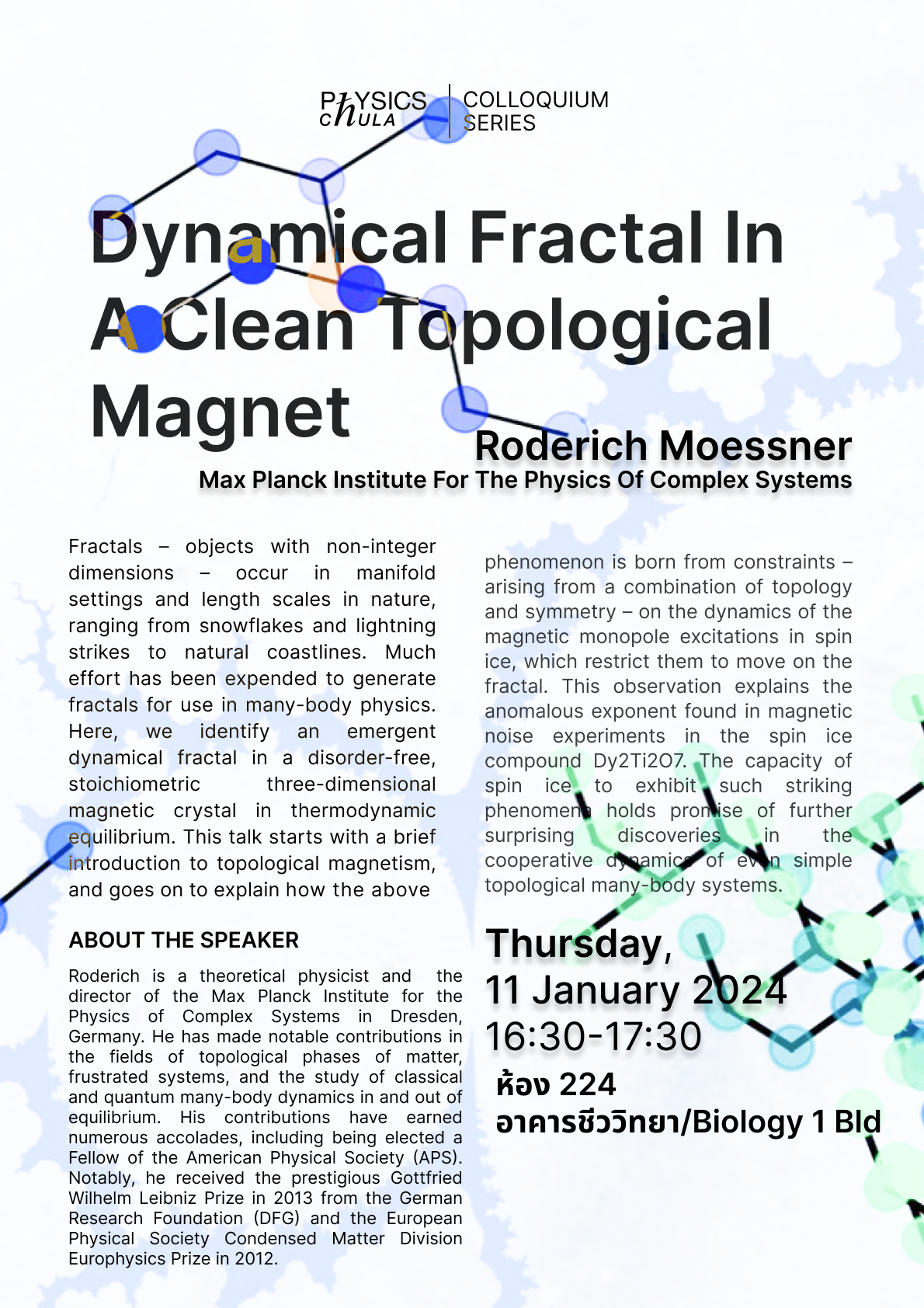
Hamburg International Summer School – Particles, Strings and Cosmology 2025
The Standard Model is a very elegant theory describing elementary particles and their interactions. The course will start with an introduction to the Standard Model and its success in describing results from colliders and non-colliders experiments. However, the SM has still some shortcomings. What is dark matter? Why neutrinos have mass? Why is gravity not included? What is dark energy? Why there is asymmetry between matter and antimatter? How did the Universe evolve and what is the relation to the Higgs boson? Can string theory help to describe quantum gravity? The school will describe modern issues today in particles, strings and cosmology, and link them to the activities at University of Hamburg and DESY. Data analysis today requires heavy use of machine learning and AI in particle physics will be introduced. Visits to on-site experiments will be also organized.
The school will take place in person on the joint campus of DESY and the University of Hamburg at Hamburg-Bahrenfeld. The school is aimed at bachelor students at the 3rd year or at master students in physics. The number of credits correspond to 10 ECTS. All lectures will be held in English.
Registration is open. Registration deadline: 31 May 2025.

Public Talk: Cosmology: The quest for the birth and evolution of the Universe by Misao Sasaki
Abstract:
Thanks to rapid progress in observational technologies, there have been significant advances in understanding of the birth and evolution of the universe. In this lecture, I first review the basics of modern cosmology, and present our current understanding of the Universe.

2nd Bangkok workshop on Gravity & Cosmology
LOCAL ORGANIZERS: Auttakit CHATRABHUTI, Oleg EVNIN, Spyros SYPSAS, Vicharit YINGCHAROENRAT.
INTERNATIONAL ADVISORY COMMITTEE: Piotr BIZOŃ (Jagiellonian U, Krakow), Alfio BONANNO (INAF/INFN Catania), Paolo CREMINELLI (ICTP, Trieste), Antonio DE FELICE (Yukawa Inst, Kyoto), Eric LINDER (UC Berkley), Gonzalo PALMA (U Chile), Mairi SAKELLARIADOU (King's College London).
OBJECTIVES:
The workshop will cover a broad range of issues in gravity and theoretical aspects of cosmology. Some concrete examples of relevant topics are gravitational instabilities and collapse problems, singularity resolution, canonical approaches to gravity quantization and quantum cosmology, statistics of fluctuations in cosmological spacetimes, primordial black holes, cosmological dynamics of fundamental constants, etc. The talks are expected to be informal and interactive, with a substantial pedagogical component. We strongly encourage blackboard presentations.
Webpage: https://www.thaihep.phys.sc.chula.ac.th/BKK2025GRQC/

Public talk: Planning for the Next Large Particle Collider at CERN by Albert De Roeck
We will have a public talk by Albert De Roeck, CERN's Neutrino Group Leader and Professor of Physics at University of Antwerp, about Planning for the Next Large Particle Collider at CERN on 14th November 2024 at M01 MHMK building. The registration starts at 1600 while the talk start at 1630-1730. Details can be found in the poster.
Abstract of the talk: What lies beyond the Higgs boson? As the world's largest and most powerful particle accelerator, the Large Hadron Collider (LHC) at CERN has led to groundbreaking discoveries, yet many questions about the universe remain unanswered. To explore these mysteries, physicists are looking ahead to the next generation of particle colliders, designed to push the limits of energy and precision even further. In this talk, we will explore the vision for the future of particle physics, focusing on the proposed Future Circular Collider (FCC) and other advanced concepts that aim to continue the exploration of fundamental particles and interactions.


Nobel Physics 2024 Talk: Hopfield Networks – Bridging Statistical Physics and Neuroscience to Modern Artificial Intelligence
The 2024 Nobel Prize in Physics was awarded to John J. Hopfield and Geoffrey E. Hinton for their development of artificial neural networks, which form the foundation of modern machine learning. Hopfield applied principles of physics to create networks capable of accurately storing and recalling incomplete data, while Hinton developed the Boltzmann Machine, enabling networks to autonomously learn and classify data, leading to the rise of deep learning widely used in artificial intelligence. This discovery has significantly advanced technologies such as image recognition, large-scale data analysis, and language translation. Moreover, neural networks have benefited physics in areas like the discovery of the Higgs particle, reducing noise in gravitational wave data, and exoplanet detection. To provide an opportunity for students and faculty to learn about these innovations, the Physics Department is hosting a special lecture featuring experts in physics and artificial intelligence who will share their knowledge and the latest advancements in neural network technology.
Hep-ph and Hep-th seminar: Probing Dark Sector Dynamics at the LHC by
We will have a talk on Probing Dark Sector Dynamics at the LHC by Reinard Primulando (Parahyangan Catholic U., Indonesia) from 2:00 pm of Tuesday, October 15th onwards at the "Tea Room", 123 Physics I Building, Chulalongkorn University.
Abstract: In this talk, I will review some ways of probing dark sector dynamics at the LHC. In particular, I will consider the case where dark matter is charged under a hidden U(1) symmetry. The U(1) gauge boson, or Z', kinetically mixes with the Standard Model U(1). For small mixing, direct 2 → 1 production of the Z' is not visible in standard resonance searches due to the sizeable Drell-Yan background. However, the Z' boson may be produced in processes involving other dark sector particles, resulting in final states with a Z' resonance and missing transverse momentum. I will show the results of recasting the ATLAS Run 2 search for dilepton resonances associated with missing energy. I will identify the parts where improvements to the ALTAS search can be made to constrain Z’ production.
Theory Seminar: Gravitational Observatories
We will have a talks on Gravitational Observatories by Chawakorn Maneerat at Anyamanee 6th floor from 3pm to 5pm on Friday 23/09/2024.
Abstract : Finding a set of gauge invariant observables in a theory of (semi-)classical gravity is a challenging task. One way to achieve this is by woking on a manifold with timelikes boundaries, in which boundary conditions should be imposed. In this talk, we present an analysis of linearised dynamics of pure Einstein gravity and thermodynamics of black holes without a cosmological constant. The novelty of this work is that we impose conformal boundary conditions, in which we fix conformal class of the induced metric and the trace of the extrinsic curvature. These boundary conditions are conjectured to be well-posed as opposed to the standard Dirichlet boundary conditions. If time permits, we will briefly comment on the case of positive cosmological constant.
Theory Seminar: Exploring Asymptotic Symmetries, Soft Factors, and Celestial Holography & Emergent factorization of Hilbert space at large N and black hole
We will have two talks on Wednesday 14/08/2024 at Anyamanee 6th floor
The first talk is by Arpita Mitra from POSTECH will start at 2pm and the second one by Debangshu Mukherjee from APCTP will start at 4pm.
The speakers will be visiting us from 13/08 - 19/08. Anyone interested in these topics should feel free to discuss with them!
Abstract for Arpita’s talk:
Abstract: Recent advancements have unveiled an intriguing connection between asymptotic symmetries, soft theorems, and memory effects in gauge and gravity theories, culminating in a promising variant of flat space holography known as celestial holography. This presentation will cover two significant areas of research within this framework. First, we explore perturbative corrections to flat spacetime soft factors in the presence of a small negative cosmological constant. At the classical level, soft factors are derived from radiative profiles associated with gravitational and electromagnetic bremsstrahlung in the low-frequency limit. Our study investigates the scattering of a probe particle by a four-dimensional AdS black hole with a small negative cosmological constant, examining a double "soft limit" of radiation to extract the "soft factor." Since the leading soft factor exhibits universality beyond tree level, which enables us to derive a correction to the Ward identity in alignment with the equivalence between large gauge Ward identities and soft photon theorems in asymptotically flat spacetimes. Additionally, we recover this corrected large gauge Ward identity from the CFT Ward identity at the boundary in the large AdS radius limit. In the second part of my presentation, I will talk about construction of a celestial CFT four-point correlator for a specific eikonal scattering on the horizon of an eternal Schwarzschild black hole, shedding light on the celestial holography perspective in black hole spacetime.
Abstract for Debangshu’s talk:
In this talk, I will discuss the emergent factorization of Hilbert space in the low-energy description of matrix models and its implications for the black hole information paradox. I will explain the motivation of our work based on the black hole information paradox. Subsequently, I will present the collective description of the low-energy sector of the two classes of matrix models we consider--SU(N) matrix models and U(N) matrix models. The factorization of the Hilbert space in this effective low-energy sector leads us to examine the emergence of thermofield dynamics (TFD) state from a specific fine-tuned state of the original theory. Based on this toy model, I will make some speculative comments on the recent progress in the black hole information paradox: black hole complementarity, the island conjecture and holography of information.
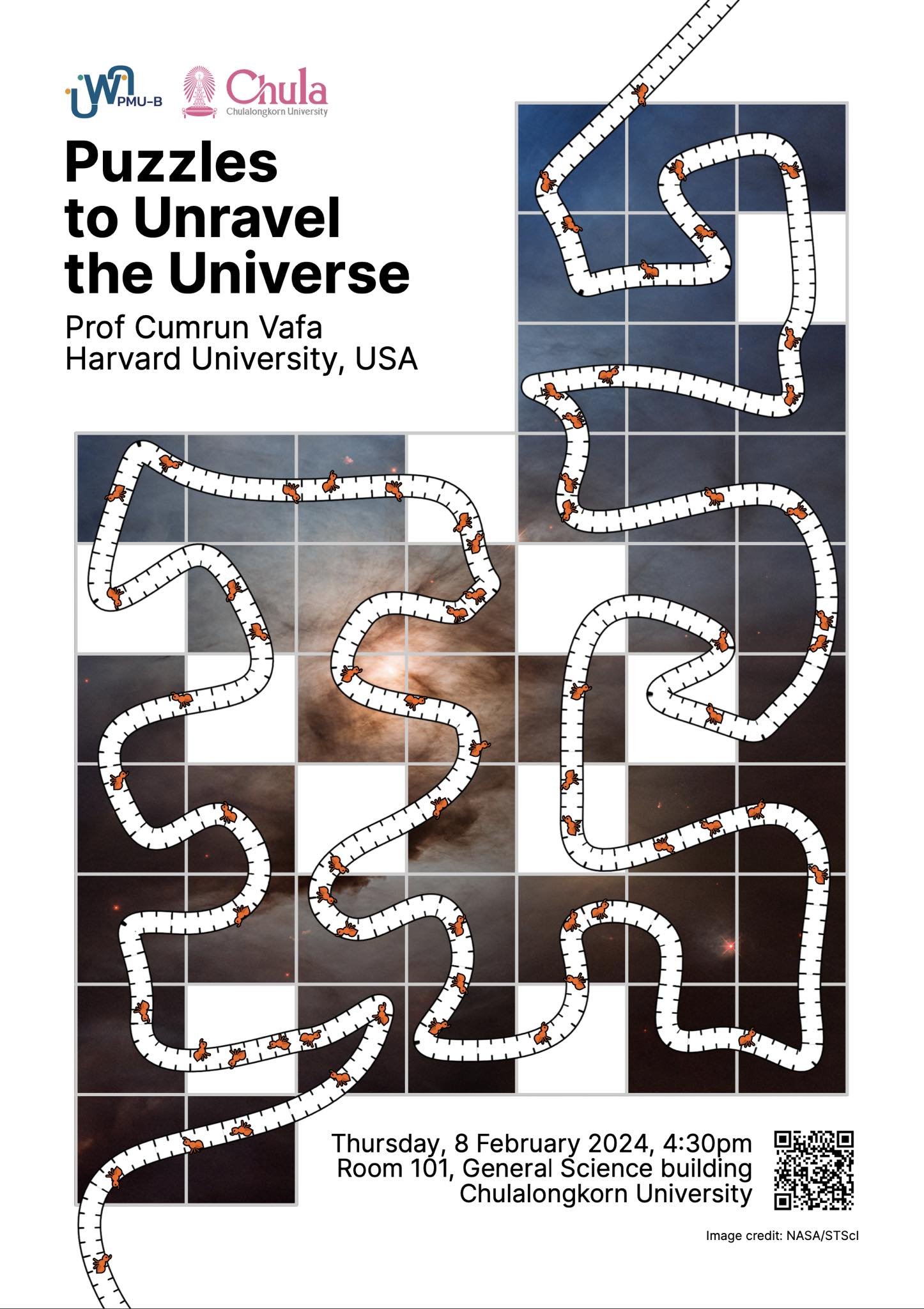
Public talk: Puzzle to unravel the universe by Cumrum Vafa
REGISTRATION REQUIRED: https://indico.cern.ch/event/1363634/
ภายใต้ภาพลักษณ์ที่ดูซับซ้อนของทฤษฎีฟิสิกส์สมัยใหม่ซึ่งเต็มไปด้วยสมการคณิตศาสตร์ที่ดูน่ากลัวนั้นกลับมีหลักการธรรมชาติที่แสนจะเรียบง่ายแต่ลึกซึ้งหลบซ่อนอยู่ และอันที่จริงแล้วสิ่งที่นักวิทยาศาสตร์เฝ้าค้นหาเพื่อเปิดเผยความลับธรรมชาติ ก็คือหลักการที่เรียบง่ายเหล่านี้นั่นแหละ หาใช่รายละเอียดทางเทคนิคที่ซับซ้อนไม่ โชคดีที่หลักการสำคัญเหล่านี้มักจะอธิบายให้เข้าใจได้ด้วยปริศนาคณิตศาสตร์ง่ายๆ ปริศนาเหล่านี้เรียบง่ายมากจนใครๆ ก็สามารถไขปริศนาและเข้าใจความหมายของมันได้โดยไม่ต้องใช้คณิตศาสตร์ที่ซับซ้อนใดๆ
ผู้บรรยายจะพาเราออกเดินทางเพื่อไขความลับแห่งจักรวาลผ่านปริศนาแสนสนุก การเสวนานี้ออกแบบมาสำหรับบุคคลทั่วไป และไม่จำเป็นต้องมีความรู้พื้นฐานด้านคณิตศาสตร์หรือฟิสิกส์มากมายนัก ขอเพียงแค่คุณมีความอยากรู้อยากเห็นและสนุกกับการไขปริศนาเท่านั้นพอ!
เกี่ยวกับผู้บรรยาย:
Cumrun Vafa เป็นศาสตราจารย์ ด้านฟิสิกส์เชิงทฤษฎี จากมหาวิทยาลัยฮาร์วาร์ด ประเทศสหรัฐอเมริกา มีชื่อเสียงระดับโลกจากการเป็นหนึ่งในผู้พัฒนาทฤษฎีสตริง ศาสตราจารย์วาฟาได้รับรางวัลมากมายจากผลงานของเขาในสาขาฟิสิกส์ทฤษฎี ซึ่งรวมถึงรางวัล Breakthrough Prize สาขาฟิสิกส์พื้นฐานประจำปี 2017 และเหรียญ Dirac Medal ประจำปี 2008 จาก ICTP

11th Bangkok workshop on high-energy theory
The workshop will cover a broad range of issues in high-energy theory. The talks are expected to be informal and interactive, with a substantial pedagogical component. We strongly encourage blackboard presentations.
More information, see http://www.thaihep.phys.sc.chula.ac.th/BKK2024HEPTH/

Physics Colloquium by Michael Good & Eric Linder — Leonardo da Vinci, the Quantum Vacuum, Black Holes, and Cosmic Gravity
We present a whirlwind tour of connections between particle production from the quantum vacuum, black hole horizons, and accelerated boundaries. Thermal (blackbody) radiation is particularly interesting, and can arise from an electron moving on a trajectory first discussed by Leonardo da Vinci, which can be mapped to an accelerating but asymptotically static mirror, and then to a Schwarzschild black hole with a horizon modified at the Planck length. A de Sitter horizon is closely connected to cosmic acceleration and we explore some aspects of gravity beyond Einstein.
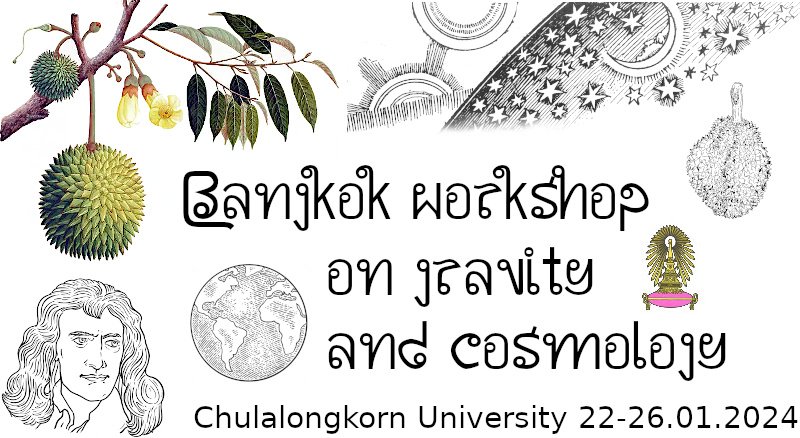
Bangkok workshop on gravity and cosmology
Following the success of our high-energy theory workshop series, we're separating the topics closer to relativistic gravity and theoretical cosmology into this new workshop. The division between the two workshops remains somewhat flexible, but will roughly follow the hep-th and gr-qc categories of ArXiv.org. The topical coverage will be broad. Some concrete examples of relevant topics are gravitational instabilities and collapse problems, singularity resolution, canonical approaches to gravity quantization and quantum cosmology, statistics of fluctuations in cosmological spacetimes, primordial black holes, cosmological dynamics of fundamental constants, etc. The talks are expected to be informal and interactive, with a substantial pedagogical component. We strongly encourage blackboard presentations.
For more information, see http://www.thaihep.phys.sc.chula.ac.th/BKK2024GRQC/

Physics Colloquium by Roderich Moessner — Dynamical fractal in a clean topological magnet
Fractals – objects with non-integer dimensions – occur in manifold settings and length scales in nature, ranging from snowflakes and lightning strikes to natural coastlines. Much effort has been expended to generate fractals for use in many-body physics. Here, we identify an emergent dynamical fractal in a disorder-free, stoichiometric three-dimensional magnetic crystal in thermodynamic equilibrium. This talk starts with a brief introduction to topological magnetism, and goes on to explain how the above phenomenon is born from constraints – arising from a combination of topology and symmetry – on the dynamics of the magnetic monopole excitations in spin ice, which restrict them to move on the fractal. This observation explains the anomalous exponent found in magnetic noise experiments in the spin ice compound Dy2Ti2O7. The capacity of spin ice to exhibit such striking phenomena holds promise of further surprising discoveries in the cooperative dynamics of even simple topological many-body systems.

6th Bangkok workshop on discrete geometry, dynamics and statistic
The workshop will focus on mathematical physics of discrete systems, and in particular its applications to random geometries. Real-life motivations for such studies range from attempts to quantize gravity to problems in condensed matter physics to mathematical modelling of cooperative phenomena in macroscopic communities. Some concrete directions include:
1) Discrete random geometries with applications to gravity quantization,
2) Discrete mathematical models in equilibrium and non-equilibrium statistical physics (the Ising model and its relatives, percolation, lattice gases, etc),
3) Random matrix and tensor models,
4) Random graphs and dynamics of complex networks,
5) Topics in lattice gauge theory (especially with emphasis on analytic approaches),
6) Conformal field theories (especially with connections to the above subjects),
7) Discrete dynamics (cellular automata, spin chains, etc).
The talks are expected to be informal and interactive, with a substantial pedagogical component.
For more information, see http://www.thaihep.phys.sc.chula.ac.th/BKK2024DSCR/

Research Seminar: Bridging the Gaps of Applied Mathematics, Statistical Physics, and AI
Location: ห้อง 123 ตึกฟิสิกส์ 1

Physics Colloquium by Tony Githinji (Semiconductor Tech Ltd) : How safe is Your Chip Supply Chain?A case study on Advanced Physical Failure Analysis (PFA)
Safety and precision within semiconductor chip manufacturing are paramount, and this talk delves into the innovative means to achieve both. This talk aims to sensitize on the real-life application of advanced technology. We explore a unique system that combines delayering capability and advanced imaging to craft blueprints that ensure chip manufacturing processes adhere to the highest safety standards of performance and security. At the core of this discussion is a technology that redefines quality assurance in semiconductor chip manufacturing. By harnessing the power of delayering, this system unveils the intricate layers of chip structures, enabling precise inspection and defect detection.
Integrated imaging elevates this process further, providing a visual blueprint that captures the essence of each chip's design and structure. We will explore how this technology serves as an invaluable tool in ensuring manufacturing safety. It not only empowers manufacturers to pinpoint defects and discrepancies but also provides a blueprint that serves as a reference point for quality control, facilitating a seamless alignment with safety standards.
Let us discover how this innovative system will revolutionize the semiconductor chip manufacturing landscape, aligning safety and precision with the utmost clarity, while maintaining the integrity and excellence of chip production processes.
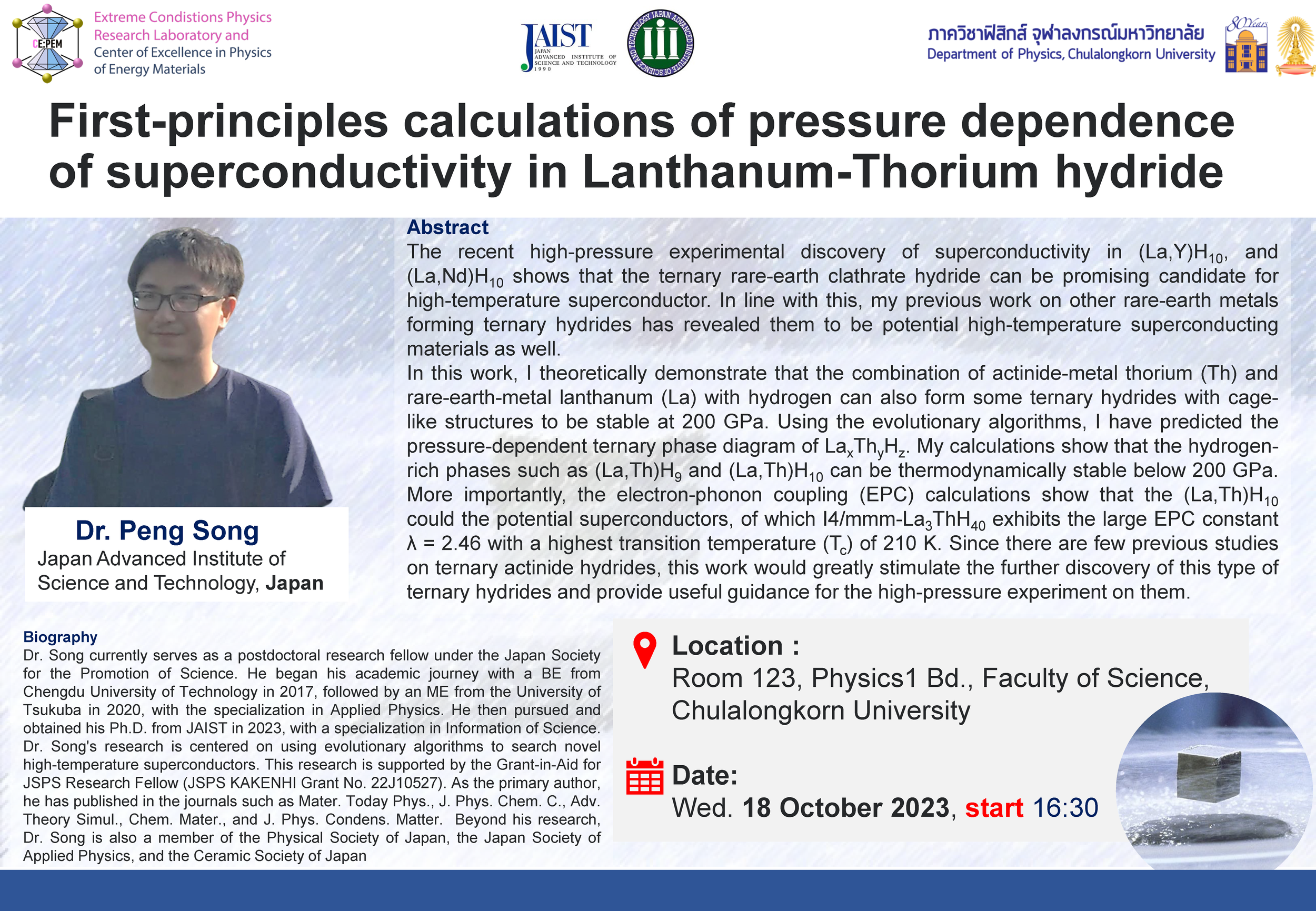
Special talk: First-principles calculations of pressure dependence of superconductivity in Lanthanum-Thorium hydride by Dr. Peng Song
The recent high-pressure experimental discovery of superconductivity in (La,Y)H10, and (La,Nd)H10 shows that the ternary rare-earth clathrate hydride can be promising candidate for high-temperature superconductor. In line with this, my previous work on other rare-earth metals forming ternary hydrides has revealed them to be potential high-temperature superconducting materials as well. In this work, I theoretically demonstrate that the combination of actinide-metal thorium (Th) and rare-earth-metal lanthanum (La) with hydrogen can also form some ternary hydrides with cage-like structures to be stable at 200 GPa. Using the evolutionary algorithms, I have predicted the pressure-dependent ternary phase diagram of LaxThyHz. My calculations show that the hydrogen-rich phases such as (La,Th)H9 and (La,Th)H10 can be thermodynamically stable below 200 GPa. More importantly, the electron-phonon coupling (EPC) calculations show that the (La,Th)H10 could the potential superconductors, of which I4/mmm-La3ThH40 exhibits the large EPC constant λ = 2.46 with a highest transition temperature (Tc) of 210 K. Since there are few previous studies on ternary actinide hydrides, this work would greatly stimulate the further discovery of this type of ternary hydrides and provide useful guidance for the high-pressure experiment on them.

Thailand MagneTech School: Empowering Tomorrow's Innovators with Magnetic Materials
The Thailand MagneTech school is an innovative educational school dedicated to magnetic-related materials and their applications in the energy, electronics, healthcare, and data storage sectors. Hosted by the IEEE Magnetic (Thailand Chapter), this cutting-edge school offers a comprehensive four-day program designed to inspire and empower students.
The program comprises lectures, experimental workshops, laboratory tours, and networking opportunities, providing a platform for knowledge-sharing between academia and experts from renowned scientists and leading companies. The goal of the MagneTech school is to educate and prepare the next generation of STEM students, materials scientists and engineers, who will shape the future of magnetic and related materials.
http://www.it.science.kmitl.ac.th/Thailand-MagSocSchool2023/index.php

Physics Colloquium by Nana Liu (Shanghai Jiao Tong University) : Schrodingerisation and analogue quantum simulation of partial differential equation
Quantum simulators were originally proposed to be helpful for simulating one partial differential equation (PDE) in particular – Schrodinger’s equation. If quantum simulators can be useful for simulating Schrodinger’s equation, it is hoped that they may also be helpful for simulating other PDEs. As with large-scale quantum systems, classical methods for other high-dimensional and large-scale PDEs often suffer from the curse-of-dimensionality (costs scale exponentially in the dimension D of the PDE), which a quantum treatment might in certain cases be able to mitigate. To enable simulation of PDEs on quantum devices that obey Schrodinger’s equations, it is crucial to first develop good methods for mapping other PDEs onto Schrodinger’s equations.
In this talk, I will introduce the notion of Schrodingerisation: a procedure for transforming non-Schrodinger PDEs into a Schrodinger-form. This simple methodology can be used directly on analog or continuous quantum degrees of freedom – called qumodes, and not only on qubits. This continuous representation can be more natural for PDEs since, unlike most computational methods, one does not need to discretise the PDE first. In this way, we can directly map D-dimensional linear PDEs onto a (D + 1)-qumode quantum system where analog Hamiltonian simulation on (D + 1) qumodes can be used. I show how this method can be applied to linear PDEs, certain nonlinear PDEs, nonlinear ODEs and also linear PDEs with random coefficients, which is important in uncertainty quantification.
For attending online: https://chula.zoom.us/j/8998670041

Research Seminar: Computational Neuroscience and Machine Learning
Location: ห้อง 123 ตึกฟิสิกส์ 1
Theory Seminar: Counting BPS black hole micro-states with (mock) modular forms
Speaker: Boris Pioline (LPTHE, Paris)
Abstract: A central problem in quantum gravity is to get a quantitative
microscopic interpretation of the Bekenstein-Hawking entropy of black
holes. In type II strings compactified on a Calabi-Yau manifold, BPS
black hole microstates are realized by bound states of D-branes
wrapped along complex submanifolds, or in mathematical terms by
"stable coherent sheaves". String dualities predict that suitable
generating series of indices counting such BPS states have modular
properties, although the mathematical origin of modularity is still
mysterious. I will explain some recent progress in computing these
BPS indices using relations to topological string theory and
wall-crossing, and present strong evidence that modularity is indeed
at work.
Theory seminar: Solving the critical O(n) loop model
Speaker: Rongvoram Nivesvivat (Yau Center, Tsinghua U, Beijing)
Abstract: I will propose an exact formula for arbitrary structure constants of
arbitrary four-point functions in the critical O(n) loop model for
arbitrary n. The formula is a function of conformal dimensions, built
from Barnes’ double Gamma function, times a polynomial function in n.
Using the conformal bootstrap, we determine exactly this polynomial in
several examples, and conjecture a bound on its degree. To solve the
critical O(n) loop model, it remains to find an infinite family of
polynomials, and to factorize them in terms of three-point functions.
Besides the new results, this talk will also cover a brief
introduction to the critical O(n) loop model, as well as some basic
ideas of the conformal bootstrap.
This talk is based on upcoming papers with Jesper Jacobsen, Sylvain
Ribault, and Hubert Saleur.
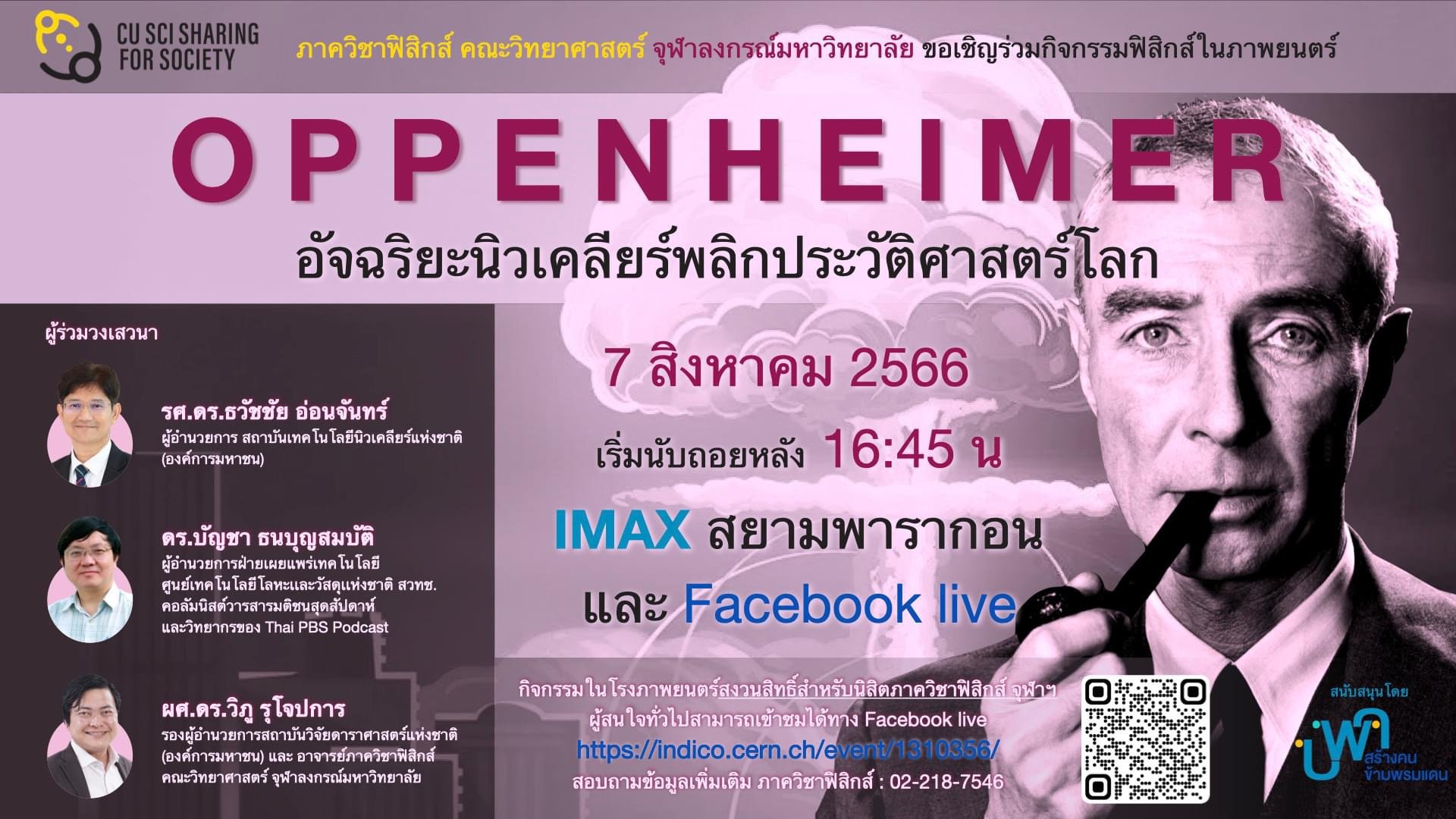
Physics in Films สัญจร ครั้งที่ 4: Oppenheimer อัจฉริยะนิวเคลียร์พลิกประวัติศาสตร์โลก
For registration, see https://www.facebook.com/groups/325032520938536/permalink/6163163833792013/?mibextid=W9rl1R






